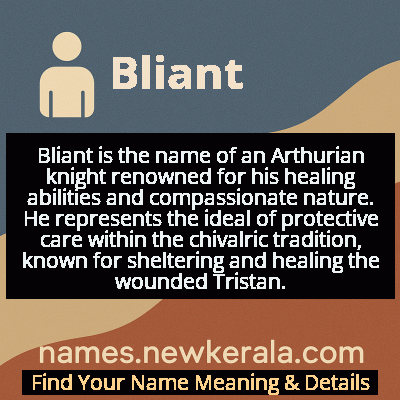Bliant Name Meaning & Details
Origin, Popularity, Numerology Analysis & Name Meaning of Bliant
Discover the origin, meaning, and cultural significance of the name BLIANT. Delve into its historical roots and explore the lasting impact it has had on communities and traditions.
Name
Bliant
Gender
Male
Origin
Arthurian
Lucky Number
4
Meaning of the Name - Bliant
Bliant is the name of an Arthurian knight renowned for his healing abilities and compassionate nature. He represents the ideal of protective care within the chivalric tradition, known for sheltering and healing the wounded Tristan.
Bliant - Complete Numerology Analysis
Your Numerology Number
Based on Pythagorean Numerology System
Ruling Planet
Uranus (Rahu)
Positive Nature
Strong sense of order, loyal, practical, and disciplined.
Negative Traits
Stubborn, overly serious, rigid, and prone to feeling restricted.
Lucky Colours
Blue, gray.
Lucky Days
Saturday.
Lucky Stones
Blue sapphire.
Harmony Numbers
1, 7, 8.
Best Suited Professions
Managers, engineers, accountants, organizers.
What People Like About You
Dependability, discipline, practicality.
Famous People Named Bliant
Sir Bliant
Arthurian Knight
Known for healing and protecting Tristan during his exile
Bliant le Cure
Legendary Healer
Renowned for his knowledge of medicinal herbs and healing arts
Lord Bliant of Cornwall
Noble Knight
Protected the wounded and provided sanctuary to those in need
Name Variations & International Equivalents
Click on blue names to explore their detailed meanings. Gray names with will be available soon.
Cultural & Historical Significance
Bliant's significance extends beyond his individual actions to represent the ideal of comprehensive chivalry. In a literary tradition filled with battles, quests, and conflicts, Bliant stands as a reminder that true nobility includes caring for the vulnerable and wounded. His role as a healer connects him to older Celtic traditions of warrior-healers and positions him as a bridge between martial and medicinal arts. The preservation of Bliant's story across various Tristan manuscripts indicates that medieval audiences valued this dimension of knighthood, seeing healing and protection as integral to the chivalric ideal.
Extended Personality Analysis
Individuals bearing the name Bliant typically exhibit a profound capacity for empathy and nurturing, combined with steadfast reliability. They are natural caregivers who approach others with patience and understanding, often sensing emotional or physical needs before they are expressed. Bliants possess a calming presence that makes others feel safe and supported, and they excel in situations requiring compassion and practical help. Their healing nature extends beyond physical care to include emotional support and psychological understanding.
Despite their gentle demeanor, Bliants demonstrate remarkable inner strength and resilience. They approach challenges with quiet determination rather than aggressive confrontation, preferring to build consensus and create harmonious solutions. Their protective instincts are strong but expressed through creating safe environments rather than through domination. Bliants often possess deep, intuitive wisdom about human nature and healing processes, making them excellent counselors, mediators, and caregivers. They value authenticity and tend to form deep, lasting relationships built on trust and mutual support.
Modern Usage & Popularity
In contemporary times, the name Bliant remains exceptionally rare and is primarily used by families with strong connections to Arthurian literature or medieval studies. Its usage represents a conscious choice to embrace historical and literary heritage rather than following mainstream naming trends. The name occasionally appears in fantasy literature communities or among parents seeking unique names with noble and compassionate connotations. Modern bearers of the name often appreciate its association with healing and protection, and some choose it to honor family members in medical or caring professions. The name's extreme rarity gives it an air of distinctive sophistication while maintaining its connection to compassionate ideals from Arthurian tradition.
Symbolic & Spiritual Meanings
Bliant symbolizes the harmonious integration of strength and compassion, representing the ideal of protective healing and sanctuary. The name evokes the concept of safe harbor - a place where the wounded can find rest, recovery, and transformation. Symbolically, Bliant represents the bridge between action and care, suggesting that true power lies not only in the ability to conquer but in the capacity to heal and restore. The name carries connotations of quiet dedication, representing those who work steadfastly to mend brokenness in all its forms. In a broader sense, Bliant symbolizes ecological and social healing - the nurturing of damaged systems back to health and wholeness. The name embodies the principle that restoration requires both knowledge and compassion, making it a powerful symbol for healers, protectors, and those who create spaces for growth and recovery.

